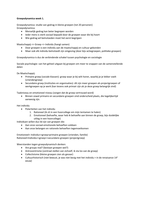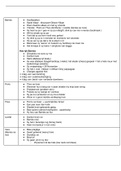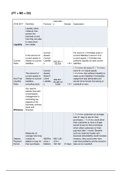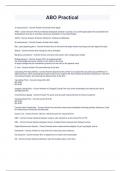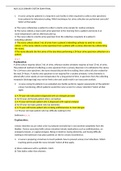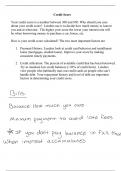Groepsdynamica: studie van gedrag in kleine groepen (tot 20 personen)
Groepsdynamica:
Menselijk gedrag kan beter begrepen worden
Ieder mens is sterk sociaal bepaald door de groepen waar die bij hoort
Wie gedrag wil beïnvloeden moet het eerst begrijpen
Maatschappij <> Groep <> Individu (hangt samen)
Door groepen is een individu aan de maatschappij en cultuur gebonden
Maar ook elk individu beïnvloedt zijn omgeving (door bijv actiegroepen, politieke groepen)
Groepsdynamica is dus de verbindende schakel tussen psychologie en sociologie
Sociale psychologie: van het geheel uitgaan bij groepen om meer te snappen van de samenstellende
delen
De Maatschappij:
Primaire groep (sociale klassen): groep waar je bij wilt horen, waarbij je je lekker voelt
(vriendengroep)
Secundaire groep (instituties en organisaties): dit zijn meer groepen als projectgroepen of
werkgroepen op je werk (kan tevens ook primair zijn als je deze groep belangrijk vind)
Taakniveau en emotioneel niveau (zorgen dat de groep vertrouwd word)
Binnen zowel primaire en secundaire groepen vind onderscheid plaats, die tegelijkertijd
aanwezig zijn.
Het individu
Polariteiten van het individu
1. Rationeel (ik zit in een hoorcollege om mijn tentamen te halen)
2. Emotioneel (behoefte, waar heb ik behoefte aan binnen de groep, bijv duidelijke
uitleg in een hoorcollege)
Individuen willen dus lid zijn van groepen die:
Aan onze sociaal-emotionele behoeften voldoen
Aan onze belangen en rationele behoeften tegemoetkomen
Emotioneel< Individu<>groep>primaire groepen (vrienden, familie)
Rationeel<Individu<>groep<>secundaire groepen (projectgroep)
Weerstanden tegen groepsdynamisch denken:
Are groups real? (bestaan groepen wel?)
Antrocentrisme (centraal stellen van zichzelf, ik sta los van de groep)
Collectivisme (kleine groepen zien als gevaar)
Cultuurhistorisch (niet bewust, je was niet bezig met het individu > in de renaisance 14e
eeuw)


